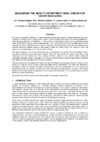Identificador persistente para citar o vincular este elemento:
https://accedacris.ulpgc.es/jspui/handle/10553/55361
| Título: | Measuring the quality of instructional videos for higher education | Autores/as: | Santos Espino, José Miguel Afonso-Suárez, María Dolores Guerra Artal, Cayetano Nicolás García-Sánchez, M. Soraya |
Clasificación UNESCO: | 120310 Enseñanza con ayuda de ordenador 5801 Teoría y métodos educativos 580101 Medios audiovisuales |
Palabras clave: | Instructional videos E-learning Quality assurance Screencasts Videocasts |
Fecha de publicación: | 2013 | Publicación seriada: | ICERI proceedings | Conferencia: | 6th International Conference on Education, Research and Innovation (ICERI) | Resumen: | The use of instructional videos to support the teaching-learning process in higher education has been increasing in recent years. Videos and all other kinds of audiovisual objects are being published on online learning platforms and MOOCs. In this context, a noticeable concern is how to produce quality material that maximizes its learning effectiveness. It is obvious that the learning effectiveness of an instructional video is affected by its contents. Moreover, the effectiveness may also be influenced by low-level technical features such as video length, audio and video quality (i.e. noise), or even the presence of postproduction items like transition effects. This paper addresses the issue of defining what characterizes the quality of an instructional video, from the perspective of the production process. We show the results of a study conducted at the Universidad de Las Palmas de Gran Canaria (ULPGC), based on the videos created within the innovative Prometeo project. Prometeo is a ULPGC corporate project aimed at developing multimedia and interactive learning objects for university students. During recent years, the project Prometeo has been building a considerable corpus of videos which serves as a data source to analyze quality and effectiveness parameters. The study has delivered a conceptual model for categorizing video characteristics, and the identification of a set of technical characteristics which are judged as influential in the overall learning effectiveness of videos. The results will help to formulate general guidelines for the successful production of instructional videos, and for quality assurance procedures. | URI: | https://accedacris.ulpgc.es/handle/10553/55361 | ISBN: | 978-84-616-3847-5 | ISSN: | 2340-1095 |
| Colección: | Actas de congresos |
Citas de WEB OF SCIENCETM
Citations
1
actualizado el 25-feb-2024
Visitas
171
actualizado el 04-may-2024
Descargas
145
actualizado el 04-may-2024
Google ScholarTM
Verifica
Altmetric
Comparte
Exporta metadatos
Los elementos en ULPGC accedaCRIS están protegidos por derechos de autor con todos los derechos reservados, a menos que se indique lo contrario.
